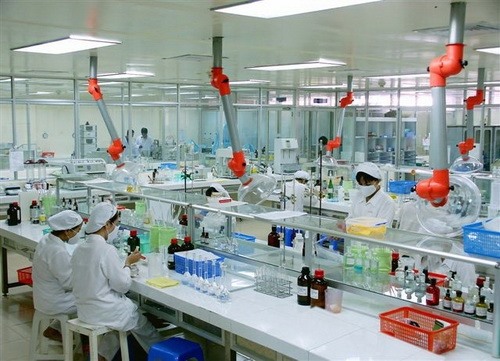Pharmaceutical stocks could be a bad bet this year, as the firms are set to report slower earnings growth for 2018.

Pharmaceutical stocks could be a bad bet this year, as the firms are set to report slower earnings growth for 2018.
Pharmaceutical companies were once defensive stocks that provided constant dividends and stable earnings regardless of the state of the overall stock market.
Their stock prices used to be high and there was little volatility in their performance.
But in 2018, leading pharmaceutical firms such as DHG Pharmaceutical JSC (DHG), Domesco Medical Import-Export JSC (Domesco) and Traphaco JSC saw their stock prices fall significantly.
DHG shares have lost 38 per cent in the past year to close Wednesday at VND82,100 (US$3.53) per share.
Domesco and Traphaco shares dipped by 36 per cent and 37 per cent respectively in the same period to VND74,100 and VND70,000 per share.
What has been weighing on those stocks were corporate earnings, which either dropped or gained modestly in 2018.
In the first nine months of 2018, DHG recorded VND2.67 trillion ($115 million) in net revenue and VND448 billion in post-tax profit. The figures were down 1.5 per cent in revenue and 10 per cent in post-tax profit compared to 2017.
Traphaco saw its nine-month revenue fall 3 per cent year on year to VND1.26 trillion and post-tax profit decrease by 42 per cent year on year to VND103.5 billion.
Meanwhile, Domesco posted a modest annual growth rate of 3 per cent in nine-month post-tax profit to VND163 billion. Its nine-month revenue gained only 2.7 per cent to nearly VND973.8 billion.
According to KIS Securities Vietnam Corporation (KIS), declining profit margins caused the reduction in profits.
The Government has recently issued some policies to reduce drug prices by 10-15 per cent by setting up a national collective procurement centre in early 2017. By mid-2018, collective bidding implemented by the centre reportedly helped cut drug prices by 21 per cent.
That means earnings for local pharmaceutical firms were somewhat dampened.
Besides, the Government also requested higher standards on origin, quality and production of drugs, leading to the fact that domestic pharmaceutical makers have to invest more in producing high-quality products.
If the production of domestic firms was controlled closely, they would have to seek other sources of input materials and cut their profit margins by 2-5 per cent, KIS added.
Additional players, both domestic and international, in the pharmaceutical retail sector was another reason for the underperformances, KIS said in a report.
Large-cap digital and electronic retailers have been joining the industry, which was valued at $5.2 billion in 2017 and projected to grow by two-digits by 2022, included FPT Corporation, Mobile World, Nguyen Kim and Digiworld.
Those four retailers have acquired local drug store chains and set up their own retail channels and sought for other supply sources, thus downsizing the revenues for domestic pharmaceutical firms.
Vietnamese people had improved their awareness of healthcare, so they preferred drugs that are sold at the hospital, KIS said. The percentage of total population with government health insurance had tripled to 87 per cent as of the end of the first nine months in 2018, showing more people had access to public healthcare and had higher demand for drugs and treatments provided by public healthcare facilities. — VNS





